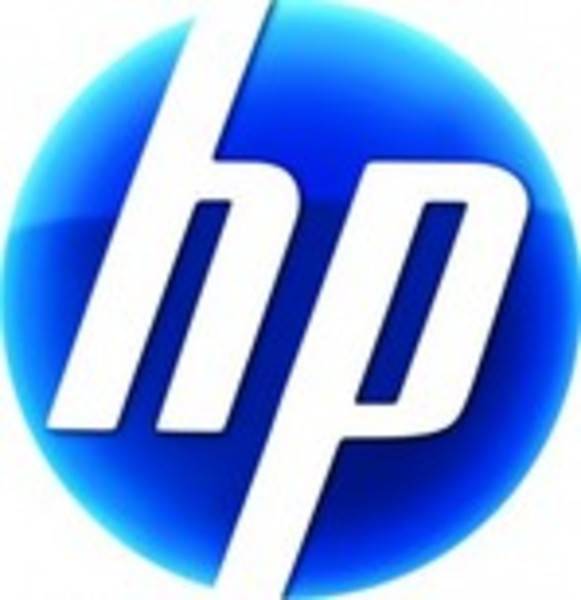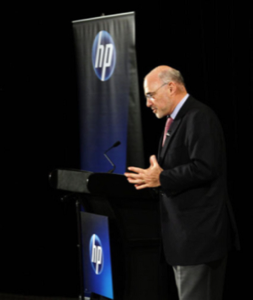It’s often said that business leaders make their companies in their own image. In that case, no two images ever stood in starker contrast with one another than the Hewlett-Packard of former CEO Mark Hurd, and the Hewlett-Packard of present CEO Léo Apotheker. Whether for better or worse, HP is becoming a different company than the one many enterprise clients signed their contracts with just a few years ago.

That fact has led one Forrester analyst to recommend this to his firm’s clients: not that they dump HP, but that they make a careful re-assessment of their business relationship with the firm, taking into consideration whether a contingency plan for switching vendors might be in order.
“It makes logical sense that HP must retain as many customers as it can through a spinoff or other divestiture,” writes Forrester’s David K. Johnson. “Consequently, Forrester believes that shoring up service and support really will become top priority and that HP customers will benefit while HP decides which way to go, which it expects to take eight to 12 weeks.”
Future-proof your business against HP’s strategy
Eight to 12 weeks, Johnson goes on, is a perfect interval for businesses to put together what he calls a “future-proofing” plan, keeping them on a strong footing with their suppliers whatever may happen to HP going forward. HP stated last month it is exploring the possible sale of its Personal Systems Group (PSG), which includes its PC production arm. That doesn’t mean it will necessarily happen, even if HP decides it wants it to; Johnson notes in talking with RWW that the only hint of a potential bite from Samsung was responded to with a flat denial.
Johnson also tells us he believes there may be plenty of reasons why companies may want to stay with HP for the long haul, even if it ends up reducing its “focus” on personal systems.
“There is good reason to believe that HP will increase focus on other areas of its business such as datacenter hardware, software and services,” he remarks. “There is a significant profit opportunity with the evolution of cloud infrastructure technologies, and it’s an area where control of the hardware, automation software and services methodology can offer significant advantages. For example, automated provisioning and scale-out of datacenter virtualization capacity is easier when the server, network, storage hardware and automation software are engineered to work together. Cisco has proven that with UCS [Unified Computing System]. When combined with operations knowledge and experience within the services team, HP is in a unique position to deliver value that smaller vendors and even Cisco, cannot.”
Mr. Scale vs. Mr. Focus
The one word that kept cropping up at HP during the Mark Hurd years was scale, as in “economies of.” The secret of the company’s success, as Hurd would describe, was its ability to leverage its expertise in big projects to do smaller things, and vice versa. Here’s one example from HP’s April 2009 quarterly conference call:

“HP has scaled services, software and hardware built upon open industry standards that differentiate us in the marketplace. We understand customer needs and can deliver integrated solutions today… Our efficiency programs are significant and ongoing and our scale provides a sustainable competitive advantage.”
By absolute contrast, the watchword for Léo Apotheker is focus. In his strategy, business challenges must be separated from one another, and met on their own terms. Note the watchword crop up in his August 16 statement announcing the exploration of sale for PSG:

“The exploration of alternatives for PSG demonstrates our commitment to enhancing shareholder value and sharpening our strategic and financial focus. In March we outlined a strategy for HP, built on cloud, solutions and software to address the changing requirements of our customers, shaped heavily by secular market trends that are redefining how technology is consumed and deployed. Since then, we have observed the acceleration of these market trends, which has led us to evaluate additional steps to transform HP to meet emerging opportunities. We believe the acquisition of Autonomy, combined with the exploration of alternatives for PSG, would allow HP to more effectively compete and better execute its focused strategy.”
Could there be a lesson for all businesses in the study of the two extremes of the past HP and present HP – perhaps one that extremes, by definition, are dangerous?
“For what it’s worth, lack of focus is a different thing than the concept of scaling out,” explains Forrester’s Johnson. “Scale is what a company must be able to achieve once the focus and prioritization of its efforts has been decided. Large companies like HP are typically in a better position to scale than smaller organizations, because they can draw from a larger group of resources when they need to organize around goals and execute. The same is true for IT organizations: Prioritize and focus, then scale out for execution. The order of these is the key.”
Can you afford to split scale down the middle?
HP has not said it’s considering exiting the server business. That’s key to the question of whether its economy of scale can continue to work if the PSG group is deprioritized or spun off. How can customers make rational assessments about whether to switch to, say, Dell or Lenovo as their PC and thin-client supplier if they already have an existing – and perhaps beneficial – relationship with HP on the high end?
“We can be reasonably sure that Dell will offer bundled discounts in order to win both the desktop and server business where they can, so HP’s ability to retain the server business with customers will depend on delivering strong differentiation and value (management and automation),” responds Johnson. “Dell still has to compete with Lenovo for the desktop/laptop business, so we don’t think Dell will have the leverage to force ‘all or nothing’ arrangements without giving up desktop ground to Lenovo. To be sure, HP didn’t make it any easier on itself to retain customers by choosing to not accompany the news with a clear divestiture plan, but HP should be able to retain a high percentage of customers on the server side.”
A QUESTION FOR YOU: Does your business consider HP to be less competitive today than it did before HP announced its reorganization?

















